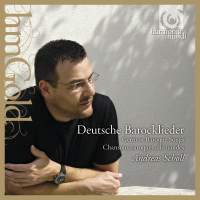Texte paru dans: / Appeared in:
|
|
|
Reviewer: Nicholas
Anderson
Scholl has arranged his programme chronologically, beginning with songs from the first half or the seventeenth century by Nauwach and Albert, pioneers respectively in the creation and establishment of continuo Lieder. Martin Opitz and Simon Dach were among the most gifted poets whom they set and both are represented here. Adam Krieger generally set his own poems to music and Scholl has chosen four well-contrasted examples of them. An attractive feature of Adam Krieger's songs are the little Italianate instrumental ritornellos which occur in many of them, Die Liebersgluth verkehrt and Seht doch wie der Rheimvein tantz ("Der Rheinsche Wein") are irresistibly charming, and realized with spirit by Scholl and his excellent continuo group with two additional violins. Der Liebe Macht herrscht Tag und Nacht, on the other hand, is an affectingly elegiac nocturne.
Johann Philipp Krieger occupies the lion's share of the programme with five strophic songs which betray little in the way of Italian influence, and a trio sonata for violin, viola da gamba and continuo which owes quite a lot to Italy. The songs come from Krieger's many operas with German texts composed for the Weissenfels court where he was Kapellmeister from 1680 until his death in 1725. The two remaining songs are by Andreas Hammerschmidt, and Johann Valentin Gomer who, along with Telemann--alas not represented here was among the last exponents of the continuo Lied.
Scholl sings
throughout with a ravishingly beautiful sound, a strong technique and
commendable attention to poetic texts. And it speaks well both of his art and of
the generally high quality of the songs that his 70-minute recital, punctuated
at three points only by instrumental pieces, held my attention effortlessly from
start to finish. An outstanding issue with full texts and translations and an
informed essay by Elisabeth Scholl. |
|
|
|
|
|
Cliquez l'un ou l'autre
bouton pour découvrir bien d'autres critiques de CD |
|



